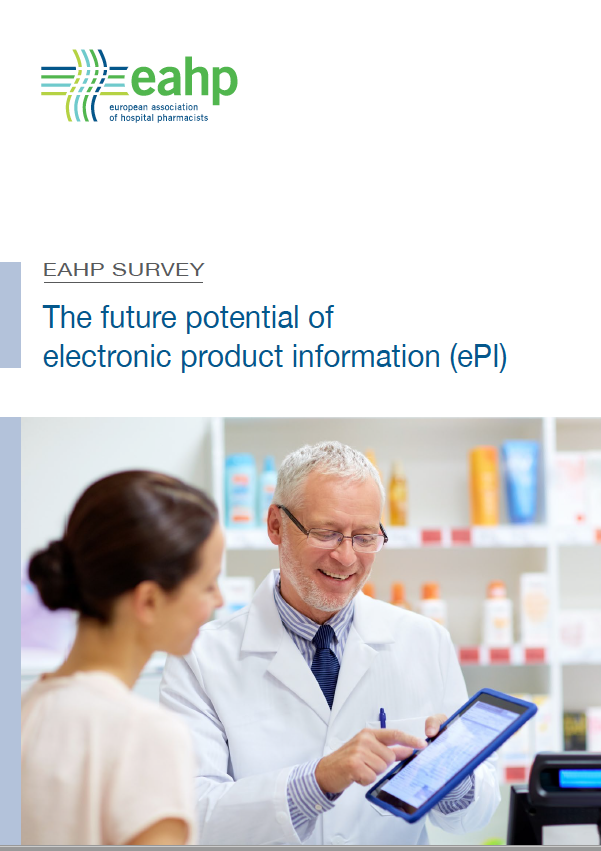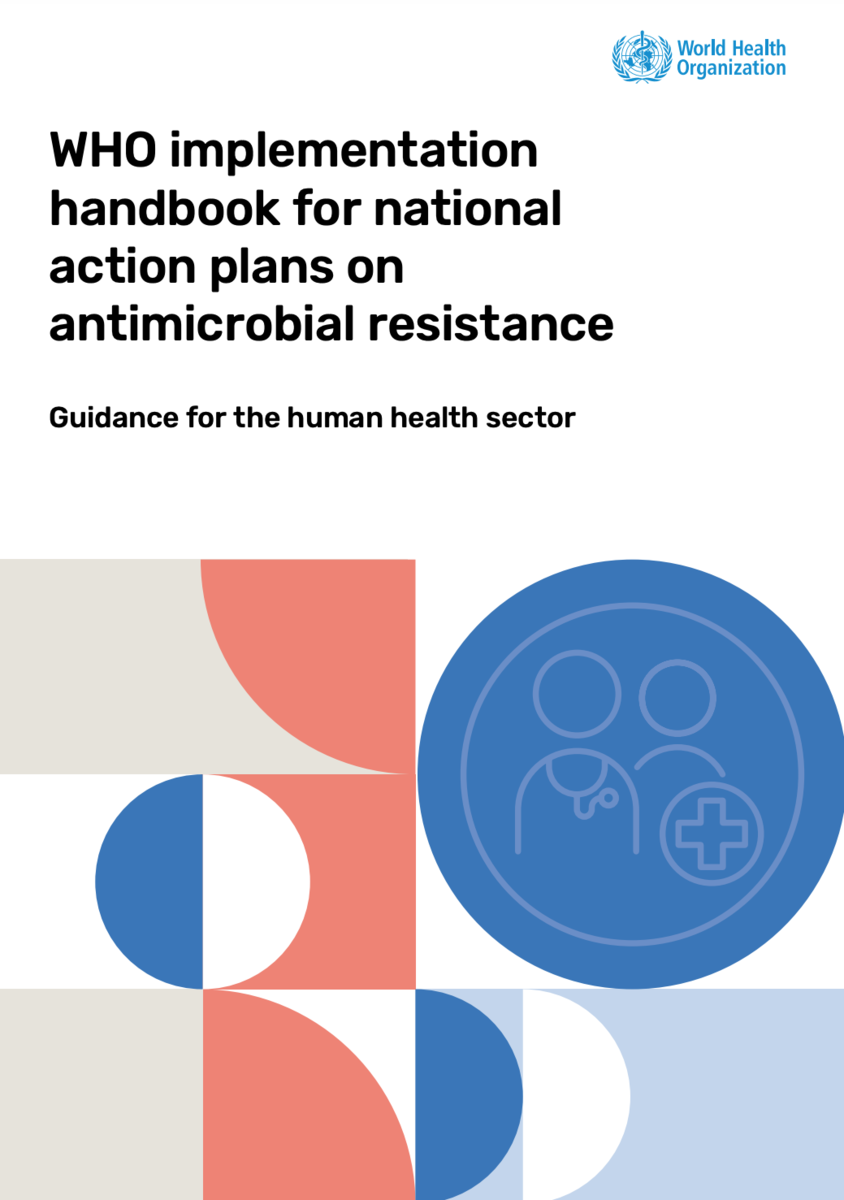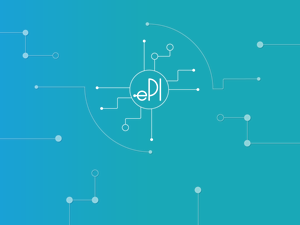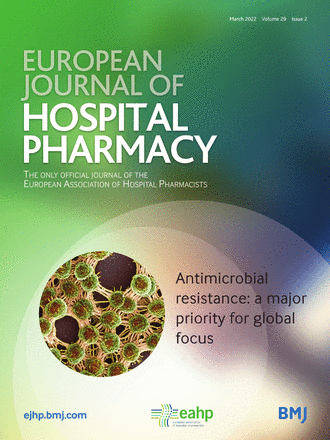EU Monitor 9 March 2022 - Have a look at the ePI survey results
The EAHP EU Monitor is a regular round up of news relevant to hospital pharmacy in Europe.
Results of EAHP's ePI survey released
 Last year, the European Association of Hospital Pharmacists (EAHP) collected information on the use of electronic product information (ePI) in European hospitals. The results of this survey activity have now been released and show that in the majority of cases an electronic/digital version of the leaflet is already used by the healthcare professionals in the hospital setting.
Last year, the European Association of Hospital Pharmacists (EAHP) collected information on the use of electronic product information (ePI) in European hospitals. The results of this survey activity have now been released and show that in the majority of cases an electronic/digital version of the leaflet is already used by the healthcare professionals in the hospital setting.
The survey activity was inspired by a project carried out in Belgium and Luxembourg evaluating the effectiveness of the electronic patient information leaflet and the key principles created by the European Medicines Agency (EMA) and the Heads of Medicines Agencies (HMA). EAHP's survey targeted hospital pharmacists that were asked to share their views and impressions about the behaviour of other healthcare professionals and patients, in particular on how, why, how frequently and in which format both of these groups are using product information. The final sections of the survey analysed the benefits and potential challenges in providing ePI in the hospital setting for both patients and healthcare professionals. The survey was carried out in cooperation with the Inter-Association Task Force for electronic product information composed out of Medicines for Europe, EFPIA (European Federation of Pharmaceutical Industries and Associations) and AESGP (Association of the European Self-Care Industry) from March to April 2021. It received 534 answers from hospital pharmacists in 36 European countries.
Almost 60% of respondents reported that healthcare professionals use the digital version when they wish to obtain information on a medicine. Hospital pharmacists (93%) are those using most frequently the digital format of the product information followed by physicians (71%) and nurses (43%). Given that the survey only targeted hospital pharmacists, it should be noted that the presumed behaviour of both healthcare professionals and patients are always the opinion of the hospital pharmacists' answering the survey.
The survey reveals that patients are usually not provided with paper package leaflets and only 21% of respondents reported that medicines information is provided orally to patients. In this regard, the majority of respondents see the potential of further informing patients by giving them access to ePI. It would also ensure that the information accessed is up to date.
The report nevertheless acknowledged that some challenges should be addressed concurrently, especially equipping hospitals with the appropriate IT infrastructure while at the same time taking into account the structural preconditions of hospitals in Europe regarding the technical equipment to use ePI in daily practice.
Read the ePI survey report HERE
Only 2 weeks to go – join #EAHP2022 in Vienna
 On Sunday, the European Association of Hospital Pharmacists (EAHP) turned 50. The Association's upcoming congress will provide the perfect opportunity to celebrate this milestone in EAHP's history. Join EAHP and hospital pharmacists from all over the world between the 23rd and 25th March 2022 in Vienna, Austria.
On Sunday, the European Association of Hospital Pharmacists (EAHP) turned 50. The Association's upcoming congress will provide the perfect opportunity to celebrate this milestone in EAHP's history. Join EAHP and hospital pharmacists from all over the world between the 23rd and 25th March 2022 in Vienna, Austria.
This year's congress theme will be focusing on "Hospital pharmacists – changing roles in a changing world". Participants will be able to choose from a wide variety of sessions focusing for example on value-based healthcare, shared decision making, working with limited resources, the role of the hospital pharmacist in disaster management, waste reduction as well as cell and gene therapies in oncology. Students and young professionals are invited to attend the student programme looking at contemporary ethical challenges in hospital pharmacy practice.
If you have not yet registered don't forget to secure your spot for EAHP's 26th Congress.
Register for EAHP's 26th Congress HERE
Learn more about the programme of EAHP's 26th Congress HERE
WHO implementation handbook for national action plans on antimicrobial resistance
 The World Health Organization (WHO) recently released an Implementation handbook for national action plans on AMR that provides guidance for the human health sector. This publication aims on the one hand at providing a practical, stepwise approach to national action plan implementation within the human health sector. On the other hand, it offers a process and a collation of WHO tools to prioritise, implement, monitor and evaluate national action plan activities.
The World Health Organization (WHO) recently released an Implementation handbook for national action plans on AMR that provides guidance for the human health sector. This publication aims on the one hand at providing a practical, stepwise approach to national action plan implementation within the human health sector. On the other hand, it offers a process and a collation of WHO tools to prioritise, implement, monitor and evaluate national action plan activities.
This publication links to the endorsement of the Global action plan on antimicrobial resistance (AMR) at the World Health Assembly in 2015 that calls on countries to develop and implement national action plans on AMR. The development itself does not pose the biggest challenge, but countries seem to struggle with the implementation of the plan based on evidence-based prioritization of activities, systematic monitoring of progress, and ensuring the sustainability of efforts. The implementation handbook seeks to address this.
The target audience of the publication includes national/subnational stakeholders working on AMR within the human health sector. This includes national health authorities, national multi-sectoral coordination groups, senior technical experts and policymakers involved in implementing AMR activities at all levels of the health system, and implementation partners to accelerate sustainable implementation and monitoring and evaluation of national action plans on AMR.
Access the implementation handbook HERE
Common Standard for the electronic product information (ePI) adopted
 The European Medicines Regulatory Network, comprised out of the Members States of the European Economic Area, the European Commission and the European Medicines Agency (EMA), has adopted a Common Standard for the electronic product information (ePI) on medicines in the European Union. This new standard will support the wider dissemination of unbiased, up-to-date information on all medicines available to patients in the EU through electronic channels.
The European Medicines Regulatory Network, comprised out of the Members States of the European Economic Area, the European Commission and the European Medicines Agency (EMA), has adopted a Common Standard for the electronic product information (ePI) on medicines in the European Union. This new standard will support the wider dissemination of unbiased, up-to-date information on all medicines available to patients in the EU through electronic channels.
The EU ePI Common Standard will support the provision of harmonised electronic information on medicines within the EU. Its adoption is in line with the ePI key principles which were established following stakeholder consultations, guide the development of the ePI in the EU and will improve the delivery of information for patients, consumers and healthcare professionals to aid their informed decision-making. It is also one of the key deliverables of an ePI project run by EMA, national competent authorities and the European Commission. A follow-on pilot project supported by the EU's funding programme EU4Health will now focus on developing tools and guidance to pilot the use of ePI prior to implementation. EMA will publish regular progress updates and will share the results with patients, healthcare professionals, academia and the pharmaceutical industry.
Learn more about the Common Standard for ePI HERE
The mandate of the European Medicines Agency extended
 On the 1st of March 2022, the Regulation reinforcing the role of the European Medicines Agency (EMA) in crisis preparedness and management of medicinal products and medical devices became applicable. EMA is now entrusted with several new tasks, including the monitoring of medicine shortages that might lead to a crisis situation and the reporting of shortages of critical medicines during a crisis.
On the 1st of March 2022, the Regulation reinforcing the role of the European Medicines Agency (EMA) in crisis preparedness and management of medicinal products and medical devices became applicable. EMA is now entrusted with several new tasks, including the monitoring of medicine shortages that might lead to a crisis situation and the reporting of shortages of critical medicines during a crisis.
The adoption of a stronger mandate for EMA is part of the European Health Union package proposed by the European Commission in November 2020. Throughout the pandemic, EMA has been a key player in the EU's response, notably in advising, assessing and authorising vaccines and medicines to prevent and treat COVID-19. The new Regulation puts these processes and structures that were established during the pandemic now on a more permanent footing. An Executive Steering Group on Shortages and Safety of Medicinal Products (also known as the Medicines Shortages Steering Group, MSSG) will be established and the Emergency Task Force (ETF) is expected to start operating under the new rules from mid-April. A representative of the Agency's Patients' and Consumers' Working Party ('PCWP') and a representative of the Agency's Healthcare Professionals' Working Party ('HCPWP') will join both the MSSG and the ETF.
Learn more about the extension of EMA's mandate HERE
Med Tech survey on electronic instructions for use for medical devices
 MedTech Europe is collecting information on the electronic instructions for use (IFU) for medical devices via a survey that targets healthcare professionals and other staff working in hospitals (administrative and pharmacists in hospitals) in the European Union. Participation in the survey takes only a few minutes. The survey will close on the 24th of March 2022.
MedTech Europe is collecting information on the electronic instructions for use (IFU) for medical devices via a survey that targets healthcare professionals and other staff working in hospitals (administrative and pharmacists in hospitals) in the European Union. Participation in the survey takes only a few minutes. The survey will close on the 24th of March 2022.
MedTech Europe aims to collect data from the European healthcare field on the use of electronic IFU versus paper versions and any preferences regarding accessibility, ease of use, storage etc. Such data would give indications whether there is support in the healthcare field for electronic IFU format for all professional use medical devices. Currently, only certain types of medical devices are eligible for the electronic format exclusively as per EU Regulation 2021/2226. It should be noted that the survey is focused on medical devices only and not on in-vitro diagnostics.
MedTech Europe is a proponent of electronic format for IFU for all professional use medical devices for the following reasons:
- Users can always access the most up to date information
- Eliminating paper IFU from each sales package would significantly reduce paper waste, the shipping weight of each product and the amount of Ethylene Oxide used
- Electronic format increases the availability of information contained in the IFU; they can be consulted anywhere. They are also easy to store, do not get lost or disposed of.
- The electronic IFU are searchable and allow for user specific views which enhances both the quality of the information delivered and the time it takes to find specific sections
- Multiple language options are available as well as a possibility to enhance legibility by increasing size of the text, which makes the electronic format user friendly.
The survey is available in the following languages: English, Spanish, German, French, Romanian, Bulgarian, Portuguese, Italian, Czech, Danish, Swedish, Croatian, Dutch, Greek and Polish. It contains 11 questions and should take no more than 10-15 minutes to complete. The individual responses collected, on top of being anonymous, will be deleted once the survey is finalised and the aggregated data is compiled.
Access the survey HERE
EJHP: Improvement in RAID questionnaire results in patients with rheumatoid arthritis treated with advanced therapies
 A new original article published in the online first edition of the European Journal of Hospital Pharmacy (EJHP) analyses the changes in patient-reported outcomes after starting advanced antirheumatic treatment. The study included all patients who started self-administered biological or targeted synthetic treatments for rheumatoid arthritis between February and November 2020. The patients were given the RAID quality of life questionnaire to complete before starting the treatment and after 4 months. Forty-six patients were included. Their ratings in the RAID questionnaire were improved after 4 months of treatment, both in the final overall total. Based on the results it was concluded that the advanced antirheumatic treatment improves the quality of life of patients after 4 months of treatment.
A new original article published in the online first edition of the European Journal of Hospital Pharmacy (EJHP) analyses the changes in patient-reported outcomes after starting advanced antirheumatic treatment. The study included all patients who started self-administered biological or targeted synthetic treatments for rheumatoid arthritis between February and November 2020. The patients were given the RAID quality of life questionnaire to complete before starting the treatment and after 4 months. Forty-six patients were included. Their ratings in the RAID questionnaire were improved after 4 months of treatment, both in the final overall total. Based on the results it was concluded that the advanced antirheumatic treatment improves the quality of life of patients after 4 months of treatment.
Read the article HERE
[EAHP Statement Corner]
Are you familiar with the commented version of the European Statements?
At the beginning of November, EAHP published the commented version of its European Statements of Hospital Pharmacy. The commented version provides additional information for some of the Statements to further clarify their meaning.
If you have not seen it yet, you can read it HERE.
[EAHP's COVID-19 Resource Centre]
Learn more about the Resource Centre
To assist its member associations and individual hospital pharmacists in this critical time with the provision of the best possible care for patients, EAHP has decided to gather and make available information on COVID-19 relevant for the hospital pharmacy profession.
Access the Resource Centre HERE
[Spotlight]
EAHP Position Paper on Hospital Pharmacy Specialisation
Hospital pharmacists are the key stakeholders responsible for medication management and safety in the hospital environment, covering both in- and out-patient services and supporting the seamless transition of care for patients moving within the healthcare system. To provide the best treatment for all patients, hospital pharmacists must be able to operate in a complex hospital setting and work collaboratively within multi-disciplinary healthcare teams.
To prepare the hospital pharmacy profession for the future, the European Association of Hospital Pharmacists (EAHP) adopted the European Statements of Hospital Pharmacy in 2014. They express commonly agreed objectives that every European health system should aim for in the delivery of hospital pharmacy services. To further enhance the quality, safety and equity of access to patient care in every European country, EAHP additionally created the Common Training Framework (CTF) project for hospital pharmacy education in Europe. This project not only fosters the further development of hospital pharmacy practice but also seeks to guarantee the access of European citizens to the highest available standard of care and the freedom of movement of the hospital pharmacy profession which is currently not accessible to all.
In June 2021, EAHP's General Assembly adopted a Position Paper on Hospital Pharmacy Specialisation. The position centres around advancing the profession by harmonising the recognition of hospital pharmacy education, enhancing the role of the hospital pharmacist and preparing the profession for future challenges.
To make a difference in medication by advancing the hospital pharmacy profession, EAHP
- calls on the European Commission and the Member States to assist the Association in setting up a CTF through the adoption of a delegated act;
- touches on the need for Member States to recognise the changing role of the hospital pharmacists and further foster their implementation; and,
- underlines the importance of further promoting the uptake of such cross-sector tools inter-sector communication, coordination and multi-disciplinary collaboration in all healthcare facilities should be strengthened.
To adequately address future challenges linked to the ageing society, changing healthcare needs and other unknown factors, like future pandemics, EAHP urges that Member States invest in better workforce planning for the hospital pharmacy profession, including the availability of hospital pharmacy services for all patients of each hospital.
Read EAHP's Position Paper on Hospital Pharmacy Specialisation HERE
[Consultations]
EDQM - European Paediatric Formulary: two draft texts released for public consultation
The European Directorate for the Quality of Medicines & HealthCare (EDQM) has released Issue 4 of Pharmeuropa PaedForm, which contains two texts for public consultation, Simple syrup (preservative-free) and Phosphate 60 mg/mL Oral solution.
Deadline – 31st of March 2022
Learn more about the consultation and contribute HERE




